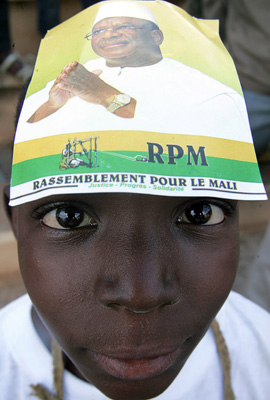Mali heads to the polls
President expected to win re-election in one of Africa’s most stable democracies.

Campaigning has generally been good-humoured and low-key, with battered minibuses doing the rounds and youths hanging off them chanting “ATT” or “IBK”, the initials of Toure’s main rival and the president of the national assembly, Ibrahim Boubacar Keita.
Toure first seized power in a 1991 coup and won international acclaim for handing over to an elected president the following year.
Dubbed “The Soldier of Malian Democracy” he then retired from the army and was elected head of state in 2002, maintaining a favourable reputation among donors and investors ever since.
 |
| Mali is one of West Africa’s more stable countries [AFP] |
Consensus
Turnout in Malian elections has traditionally been low due to high levels of illiteracy.
Many voters in some rural areas also have to walk long distances to cast their ballots.
Mali’s unusual style of consensus government, under which Toure has the backing of more than 30 political parties, also means many voters feel the outcome is almost inevitable.
But some opposition supporters hope a low turnout may work against the incumbent, forcing the elections to a second round if he fails to win more than 50 percent of the vote.
“ATT has not resolved all the country’s problems. There is still a lot of youth unemployment,” Cheikh Oumar Kouyate, a 27-year-old, unemployed accountancy graduate, said.